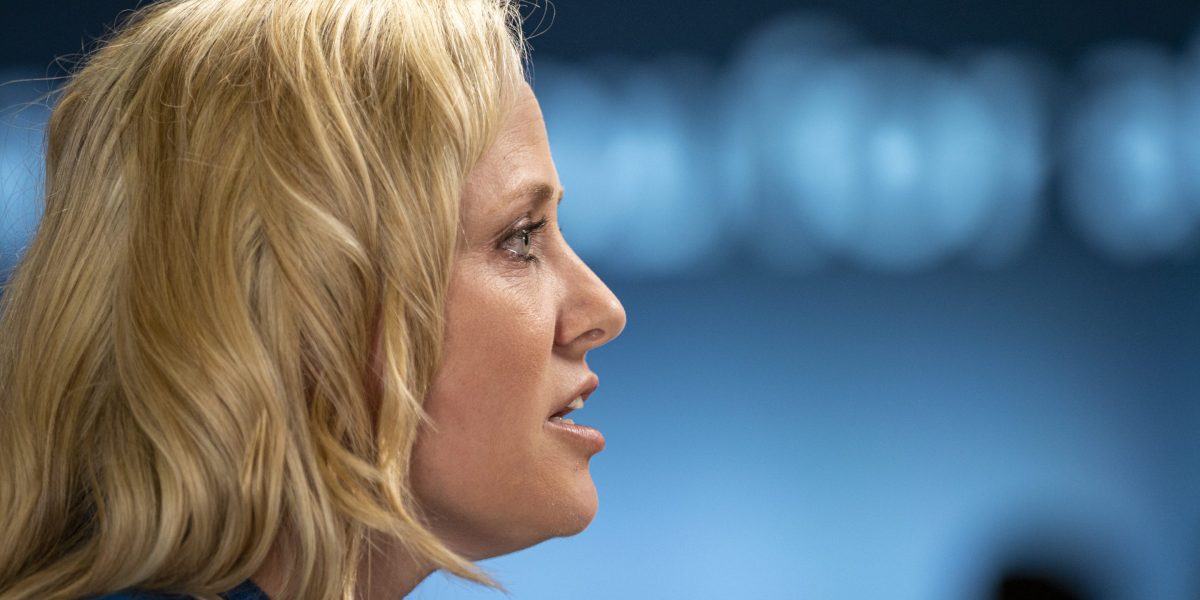Good morning. At the time I’m writing this, the price of Bitcoin is flirting with $100,000 for perhaps the third time in the last week.
That’s about 40% higher than it was before Election Day in the U.S. and 120% more than it started the year.
Why mention it? Oh, no reason. Today’s news below. —Andrew Nusca
Want to send thoughts or suggestions to Data Sheet? Drop a line here.
Chinese hackers are mobilizing, U.S. official says


A top U.S. cybersecurity official says Chinese-linked hackers are preparing for a major conflict with the United States.
Morgan Adamski, executive director of U.S. Cyber Command within the Dept. of Defense, said Friday at an industry conference that the hackers have gained access to critical information technology networks in anticipation of launching disruptive attacks in the event of conflict between the two nations.
The hackers could manipulate HVAC systems in server rooms or disrupt power and water to datacenters.
Federal agencies are, of course, working with potential targets to mitigate the issue. Adamski said the U.S. government is “laser-focused on degrading and disrupting PRC cyber operations worldwide.” China, for its part, officially denies operations targeting the U.S.
One of the most prominent such operations was the so-called Salt Typhoon attack, which this year breached several U.S. telecom companies to steal call records, obtain law enforcement request information, and listen to communications working for both U.S. presidential candidates during the past election.
Sen. Mark Warner, the chairman of the Senate Intelligence Committee, told the Washington Post last week that the incident was “the worst telecom hack in our nation’s history—by far.”
TikTok’s CEO reportedly asked Musk for Trump guidance
Elon Musk and his close relationship with President-elect Donald Trump are seen as helpful to TikTok CEO Shou Chew, who has reportedly reached out to the Tesla chief.
The two have known each other for several years. So despite owning rival social media platform X, Musk was asked for his opinions on an array of issues, including the incoming Trump administration and potential tech policy, after Chew initiated messages in recent weeks, according to a Wall Street Journal report.
While a Jan. 19 deadline looms for parent company ByteDance to sell TikTok or face a U.S. ban, Musk and Chew reportedly didn’t discuss specific options for TikTok to keep operating here. But Chew has been updating ByteDance executives on the discussions, and they are said to be cautiously optimistic on their U.S. prospects.
The lines of communication between Musk and Chew could be critical as ByteDance navigates the next few months. While Trump tried to ban TikTok during his first term, he opposed the law that was signed this year. Sources told the Washington Post this month that Trump will try to block a U.S. ban, but Congress would have to pass another bill that Trump then signs to fully reverse the law. —Jason Ma
Amazon to invest $4 billion in Anthropic
Amazon will invest $4 billion in the Anthropic, doubling the amount of money the Seattle tech giant has invested in the AI startup since last year.
Amazon will remain a minority investor in Anthropic. The startup in turn will make Amazon Web Services its “primary training partner” and use so-called Tranium chips from Amazon’s Annapurna Labs to train and run its models.
San Francisco-based Anthropic was founded in 2021 by siblings Dario and Daniela Amodei, former executives at OpenAI (in which Microsoft now holds a 49% stake), and five colleagues. A September report pegged the company’s current valuation at $40 billion.
Regulators have paid close attention to the deepening ties between Big Tech and the nascent leaders of today’s AI wave. That includes Amazon and Anthropic. Two months ago, U.K. regulators determined their financial relationship was not large enough to require a formal investigation.
Meta just can’t quit Cambridge Analytica scandal
Meta has definitively failed in its attempt to avoid a shareholder lawsuit over the Cambridge Analytica scandal.
Around six years ago, it came out that a data company called Cambridge Analytica—which boasted Trump aide Steve Bannon as a board member—had improperly used Facebook data to build voter profiles.
Although Facebook’s rules forbade such things, the episode showed how poor the company’s controls were, regarding what happened to the data that many partners could access.
Meta’s shareholders sued on the basis that it hadn’t disclosed risks around data misuse, and the share price got hammered when the scandal came out.
A federal appeals court allowed the suit to go ahead, so the company went to the Supreme Court, which dismissed its appeal Friday. So the suit will proceed, ensuring that Meta doesn’t get to move past this damaging scandal as soon as it would like. —David Meyer
Saudi Aramco to invest $1bn in U.S. telco tech maker Mavenir
The digital arm of Saudi Aramco, the state-owned oil and gas company, is reportedly in talks for a minority stake in U.S. telecom software maker Mavenir.
A Reuters report published Friday says a deal, though not guaranteed, “is likely to be signed before the end of the year.” It would be the first major telecommunications deal for Aramco Digital, as the subsidiary is known, that’s part of Saudi Arabia’s tech-forward Vision 2030 plan to diversify its economy.
Mavenir is based in Richardson, Texas and makes so-called Open RAN—radio access network—software that promises to reduce expenses for telecom companies supporting a mobile network by supporting a wide array of hardware. It was founded in 2017 through the merger of three companies—Mitel Mobile, Ranzur, and Xura—and has reportedly raised some $800 million.
Both the Trump and Biden administrations have backed Open RAN tech as a way to ease reliance on Chinese suppliers like Huawei. An Aramco-Mavenir deal would likely go through a U.S. national security review.
More data
—Kia, Hyundai, Genesis recall 208,000 electric vehicles for loss of power during driving.
—SEC penalties reach record $8.2bn in 2024. Half is from the Terraform Labs-Do Kwon crypto fraud case.
—Northvolt CEO steps down after U.S. bankruptcy. The Swedish battery maker laid off 1,600 people two months ago.
—Germany’s Bosch cuts worker hours in soft economy. The majority of the conglomerate’s revenue comes from auto supplies.
—HarperCollins strikes AI deal. The book publisher will receive $2,500 per selected book to train an LLM for up to three years.














